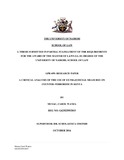| dc.description.abstract | This study strives to explore and analyse the use of extrajudicial measures in countering terrorism in Kenya. The study looks at what counter-terrorism entails and in specific does an in-depth research on the use of extrajudicial measures in the fight against terrorism. The researcher addresses the judicial measures, reasons as to their inadequacy and the need to look at other effective measures. The researcher discuses extrajudicial measures, as most of the measures suggested do not fall within the bracket of judicial measures. The researcher reviews the legality, justiciability and analyses the extrajudicial measures. Finally, the researcher implores the strengths and weakness of extrajudicial measures in countering terrorism in Kenya. Considerations are therefore made in reference to human rights of the citizens by looking at State security and the rights of terror suspects.
This chapter therefore discusses various terms and concepts, background to the problem, statement of the problem, theoretical framework, literature review, objectives of the research, hypotheses, research questions, research methodology and chapter breakdown.
When discussing the above, it is important to highlight the use of the following terms;
1.1.1 What is Terrorism?
At the national level, Section 2(1) of the Prevention of Terrorism Act1 provides for the definition of a terrorist act. This has been defined as;‘The use of violence against a certain class of people, by creating serious risks to their safety or health. It results to loss of property since firearms and explosives are used. In most cases, the main aim of a terrorist is to cause fear or intimidate a class of people and cause distractions in governments and institutions by prejudicing national security or public safety’.
It is clear that from the above definition that the Laws of Kenya only provides for the definition of a terrorism act but no meaning of terrorism.
The regional law, OAU Convention on Prevention and Combating of Terrorism,2 defines terrorist action to mean:
‘any act which is a violation of the criminal laws of a State party and which may endanger the life, physical integrity or freedom of, or cause serious injuries or death to, any person, any member or persons or group of persons or may cause damage to public or private property, natural resources, environmental or cultural heritage. This act is calculated or intended to intimidate, put in fear, force, coerce or induce any government, body, institution, the general public or any segment thereof. For one to do or abstain from doing any act or to adopt or abandon a particular, standpoint or to act according to certain principles; or disrupt public service, the delivery of any essential service to the public or to create a public emergency, or create general insurrection in a State. Any promotion, sponsoring, contribution to, command, aid, incitement, encouragement, attempt, threat | en_US |



